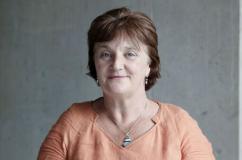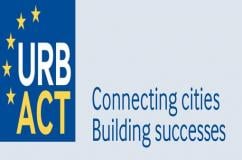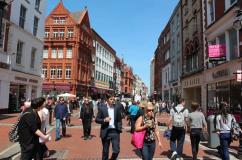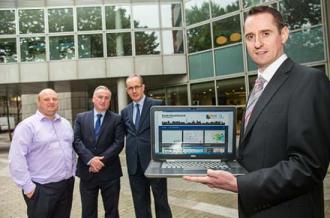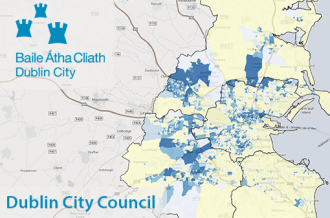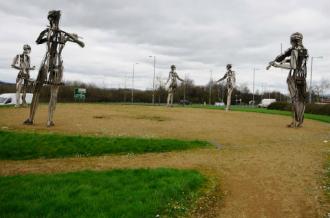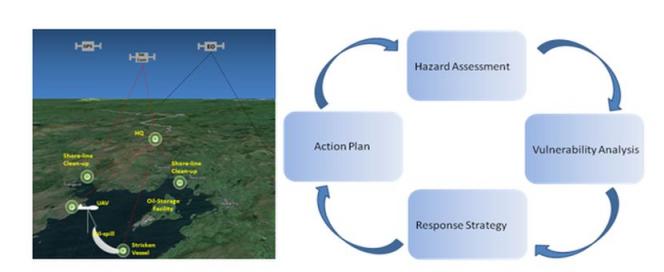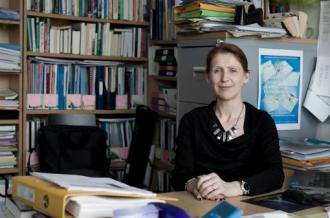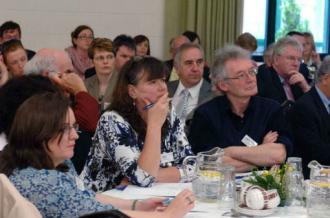RE-InVEST project : Rebuilding an Inclusive, Value-based Europe of Solidarity and Trust through Social Investments
Funded by a European Commission Horizon2020 research fund
The RE‐InVEST project is funded under H2020 Euro 3 ‘European Societies after the Crisis’. It will mobilise 19 stakeholder organisations in twelve countries through a participative approach involving a crossing of knowledge between academics, civil society and people experiencing the reality of poverty. It aims to provide a stronger intellectual foundation to the European Union Social Investment Package, through (a) philosophical reframing in the human rights and capabilities tradition, (b) qualitative and quantitative empirical analysis of various building blocks, particularly labour market activation, social protection and regulating for minimum social service standards, (c) creative proposals relating to fiscal policy, funding and governance of social investment.
The project is led by principal investigator Ides Nicaise (KU Leuven). Maynooth University is a significant collaborator, Dr Mary P. Murphy in the Department of Sociology is a member of the management board of the project and leads two of the project's eight work packages.
To see RE-InVEST in action please visit RE-InVEST
National Contact Point for Ireland for URBACT 3 (2015-2017)
Funded by: EU/URBACT and the Department of the Environment, Community and Local Government
URBACT is the European Territorial Cooperation Programme fostering sustainable integrated urban development in cities across EU Member States, Norway and Switzerland. URBACT is an instrument of the Cohesion Policy, co-financed by the European Commission (ERDF) and Member/ Partner States. URBACT enables cities to work together and develop integrated solutions to their local challenges. In URBACT networks, cities share experiences and learn from one another, draw lessons and transfer good practices to enhance their urban policies.
Professor Mark Boyle (PI in MUSSI) and Caroline Creamer will serve as National Contact Point for Ireland for the URBACT 3 Programme (2014-2020). In this role he will work with Department of the Environment, Community and Local Government to promote and support Irish submissions to the programme. All interested stakeholders (planners, local authority officials, local politicians, central government officials, academics, and voluntary organisations) should consider applying to URBACT 3 for support if they are interested in sharing best practice on topics as diverse as: what to do with abandoned spaces, how to capacity build, improving city planning outcomes, promoting culture and heritage, supporting disadvantaged neighbourhoods, improving energy efficiency, addressing housing crises, promoting low carbon futures, preparing strategic plans, lubricating urban mobility, fortifying urban renewal, stemming urban sprawl, and improving urban-rural connections.
Recent URBACT projects undertaken in Ireland include:
- “Place making for Cities” On the transfer of good practice between 4 European Cities
- “LINKS” On eco-restoration of historic buildings and associated socio-economic and environmental benefits
- "UseACT” Project aiming to define ways to achieve opportunities for people and businesses to settle in existing locations without consumption of further land
For more information on URBACT 3 please click URBACT 3
Stakeholders in Ireland who wish for further information on the process of submitting a bid should contact Professor Mark Boyle - [email protected].
National Contact Point for Ireland for ESPON (2014-2020)
Funded by European Regional Development Fund
Professor Mark Boyle and Ms Caroline Creamer based in MUSSI serve as the Irish National Contact Point (NCP) for ESPON. ESPON is an EU (ERDF) funded European Territorial Cooperation programme whose remit is to produce pan-European, comparable research and evidence to inform and underpin policy concerning urban and regional development. Its focus is upon uneven geographical development, spatial (in)justice, governance and policy. Its core mission is to capture knowledge concerning territorial development and to transfer this knowledge in an effective way to the policy community. To this end ESPON is supported by a network of ESPON NCPs - each of the 32 countries participating in ESPON have a designated NCP. The aim of the ESPON Contact Point network is to support the capitalization of ESPON results in the transnational context, and to improve the sensitivity and awareness of policy makers and practitioners. For more information please click
ESPON
Dublin Dashboard
Funded by: Science Foundation Ireland/European Research Council
Based upon a European Research Council (ERC) funded award to Professor Rob Kitchin (‘The Programmeable City”) and enabled by support from Science Foundation Ireland (SFI), Dr Gavin McArdle and Professor Rob Kitchin have developed a new Dublin Dashboard with Dublin City Council. The dashboard provides citizens, government employees and companies with real-time information, urban indicator and benchmarking data, and other forms of data about all aspects of the city – transport, environment, economy, housing, culture, population, health, etc. – through a series of interactive graphs, maps and apps. As part of this project the team carried out an extensive data audit to determine the relevant data sources available for Dublin. They polled organisations such as DCC, Dublinked, the Central Statistics Office, Eurostat, the All Island Research Observatory and government departments and studied other examples of city dashboards. They then developed a distinctive website and produced interactive maps and visualisations to provide up-to-date intelligence about the city that will help foster smart decision making and smart citizens. Due to the quantity and variety of data sources and tools provided in the Dublin Dashboard, it is one of the most extensive city dashboards available. The Dashboard received much media attention when it was launched in September 2014 and is continually updated as new data sources become available. The Dublin Dashboard was covered by RTÉ, the Irish Times, the Irish Independent and was presented at the Smart City Expo World Congress and the Dublin Web Summit in 2014.
See the Dashboard in action at:
Dublin Dashboard
Dublin City Council Housing Monitoring Tool
Funded by: Dublin Region Homeless Executive (DRHE)
This project was conducted on behalf of Dublin City Council Housing and Residential Services and the Dublin Region Homeless Executive (DRHE) and was undertaken by the All-Island Research Observatory (AIRO). based within MUSSI.
The project focuses on demonstrating how the cartographic visualisation of housing data for Dublin and the production of an online housing monitoring tool can be used to support decision-making in relation to the delivery by a local authority of its role and statutory responsibilities in the provision of housing and related services. The Housing Monitoring System contains an exhaustive set of all housing Census variables in Ireland. Within the system there are over 700 variables available to users. The monitoring systems provides easy access to Census housing data at both the Electoral Division (ED) and Small Area (SA ) level across the region. In addition to this, the study worked with the Department of Social Protection to gain access to a 'Rent Supplement' database and investigate the potential for mapping the level of public expenditure that currently supports private rented housing across the Dublin region. Following a strict data protection protocol the project team have aggregated data to produce non-disclosive variables on Rent Supplement at the Electoral Division level across the Dublin region. Variables are available on total payments, payments per '000 households, payments by gender, payments by length of claim and also levels of actual expenditure on a monthly basis at the local level.
More details: click here
Supporting Cross Border Spatial Planning
Funded by: INTERREG, the Department of Foreign Affairs and Trade’s 'Reconciliation Fund' and the North West Partnership Board (NWPB the North-West Partnership)
Since 2011, and its roll-out of an INTERREG funded executive training programme with Derry City Council, Donegal County Council and ILEX, a NIRSA led ICLRD project has developed a robust working relationship with key stakeholders in the North West region of the island of Ireland. This was further enhanced with the award of funding in 2013 from the Department of Foreign Affairs and Trade 'Reconciliation Fund' to develop an action plan for the North West Partnership Board (NWPB). The Partnership Board, established in 2011, is a multi-sectoral platform committed to driving the future development of the region through collaborative working. Drawing on the strong history of cross-border collaboration and cooperation in the North West Region, as well as the core documents influencing the direction of development in the region at both a national and local level, the Action Plan developed by the NIRSA led ICLRD team - with the NWPB engaged at every stage - identified four thematic areas for cooperation and collective projects: tourism, renewables and the green economy, health innovation and well-being, and culture and the creative industries. The core objective of the resulting Action Plan is to link strategic local priorities with central government programmes and spatial strategies (including the North West Gateway Initiative) and provide an evidence-informed programme for dialogue on the shared, mutual interests of the region.
Spatial Decision Support for Oil Spill Management
Funded by Petroleum Infrastructure Programme (PIP)
Marine petroleum affects the environment, economy, and quality of life for coastal inhabitants leading to concerns that include resource exploration, recovery, transportation, and resultant oil spill contingency planning, mitigation, and remediation. Oil spills have, for many decades, been a significant environmental risk within marine environment worldwide. In recent years we have seen vast improvements in safety standards leading to decreases in the number of accidents worldwide. Accidental oil spills such as the Deepwater Horizon incident in 2010 remind us of the dramatic impacts that oil can have on the environment. These events also remind us of the importance of efficient emergency planning & response management. Geospatial technologies such as Remote Sensing and GeoInformatics play an important role in helping collate, analyse and visualise information in order to make good decisions when managing offshore oil-spills.
This project was awarded funding following the 2013 Petroleum Infrastructure Programme (PIP) research call and will run from June 2014 to Feb 2016. The NCG research team propose designing and building a state of the art platform for supporting decision making in response to oil spill events in the marine environment. This prototype platform will be cloud-based using Open Source components & Web services that are compliant with best industry standards including W3C and OGC. Interoperability underpins the successful operation of this platform so,
OGC's Web Services will be used to help guide robust design & implementation of various Web based spatial datastream services. An initial review of information requirements with various stakeholders will be carried out in order to draft a functional specification document which will revolve around key items of data & information required to help make decisions. Access control will be implemented allowing users access data and functionality within a secure environment. The platform will support presentation of GIS Map layers as well as more dynamic near real-time sensor streams. Some of the data-inputs are listed below and include Earth Observation (EO), geographical datasets. Tools will be designed and coded to enable data discovery including search and retrieval.
Integrated Satellite & Airborne Remote Sensing for Forestry Mapping
Funded by Science Foundation Ireland (SFI) Industry Research Fellowship programme (Nov 2013 - Nov 2015)
The overall goal of this proposal is to enable TreeMetrics Ltd, a geospatial technology industry partner to collaborate with NCG, Maynooth University for mutual benefit in terms of research & innovation outputs. Core to this partnership will be development of a new forestry information services enabling forestry yield and biomass to be calculated in a more expedient fashion using Satellite Remote Sensing, Remotely Piloted Aircraft Systems (RPAS) carrying latest multispectral imaging & LiDAR sensors.
The main aim of the work-programme is to integrate & fuse data from both LiDAR & multispectral sensors, acquired onboard unmanned aerial vehicles (UAV), into TreeMetric's existing workflows that are based primarily around Earth Observation and terrestrial LiDAR. This aim will be achieved through four main objectives including review of recently developed UAV sensors, a detailed assessment of information content, data-stream integration within existing cloud-based platform and commercial appraisal. This novel geospatial information service will enable TreeMetrics to satisfy the growing demands from their clients for more detailed, cost-effective forestry inventory & habitat data.
International Centre for Local and Regional Development (ICLRD)
NIRSA is a founding partner of the International Centre for Local and Regional Development (ICLRD), a registered charity involving partners from Ireland, Northern Ireland and the United States. The partnership, involving NIRSA, School of the Built Environment at Ulster University and the for International Urban Development in Cambridge, Mass. brings together practitioners, academics, researchers and policy-makers to explore and expand the contribution that local and regional development and wider spatial planning issues can make to the peace and reconciliation process on the island of Ireland.
As a registered charity, the ICLRD
- Carries out applied/action research and provides independent policy advice on cross-border and all-island spatial planning and local and regional development issues;
- Offers professional education, capacity building and animation programmes for local and regional government representatives and officials, civic leaders, non-governmental organisations and other practitioners involved in local, regional and national development;
- Acts as a catalyst to bring relevant public and private actors, North and South, together to work on common goals; and
- Assists local governments and communities in translating policy into ‘on the ground’ action.
Since 2006, the
ICLRD has successfully secured funding from a range of sources to support its activities; including the
International Fund for Ireland,
InterTradeIreland,
Irish Central Border Area Network (ICBAN),
INTERREG IIIA and
IVA,
Higher Education Authority (HEA), and central government departments and local authorities, North and South. Given this diversity of funding sources, the Centre has been privileged to work with a diverse range of bodies and organisations over the years - including North-South bodies, cross-border networks, regional and local authorities, universities, community organisations and NGOs, and central government.
Informal feedback from our work in the past tells us that we are regarded as an organisation which listens, translates needs and challenges into solutions, is agile in its delivery, and is able to keep pace with the environment of those for whom the ICLRD's work is so relevant.
In recent years, the
ICLRD has worked with
- The North West Partnership Board on developing a strategic action plan for the period 2014-2020;
- Armagh City and District Council and Monaghan County Council on establishing an enabling agreement;
- Donegal County Council and Derry City and Strabane District Council to review the nature and form of future strategic cross-border collaboration and partnership in the North West region;
- Centre for Cross Border Studies and a Steering Committee of stakeholders from the Irish border region on progressing the concept of the 'Border Development Corridor';
- Irish Central Border Area Network (ICBAN) on supporting the development and roll-out of their INTERREG IVA-funded Spatial Planning Initiative, and specifically their Regional Strategic Framework, 2013-2027;
- The Cross Border Emergency Planning Management Group (including representatives of local authorities, fires, police and ambulance services and health executives from both sides of the Irish border) on developing a 'proof of concept' cross-border mapping tool and providing guidance on the critical issues pertinent to the progression of cross-border cooperation on emergency planning; and
- The Border Regional Authority, Irish Sports Council and associated local authorities (Sligo, Leitrim, Donegal, Cavan, Monaghan and Louth) on mapping greenways and considering the potential for a regional greenway project.
Truagh-Aughnacloy Social Enterprise Development
In recent years, the ICLRD provided technical assistance to a number of community development associations along the North Monaghan/South Tyrone border. With the support of the ICLRD, the development associations from Truagh, Aughnacloy, Aghaloo, the Bawn, Loughans, Clara and Carrickroe came together to develop a community business and social economy plan - this was the first time that these neighbouring associations had formally worked together post-Troubles.
Given the many socio-economic challenges facing this region including ethno-political legacies stemming from the Troubles, a core objective of this work programme was to gain insights from both a cross-border and cross-community perspective into the types of social economy and community development activities that would be favoured locally. With funding and consultancy support from
LEADER and mentoring from the
ICLRD, the community groups prepared the North Monaghan Development Framework, a study based on a vision of the sub-region as an economically sustainable and outward looking border catchment area where people and communities are empowered to achieve their best. Action points contained within the Framework include examining the feasibility of a branded business development and marketing initiative; an independent living project providing support services to lone dwellers and older people; and the implementation of a youth employment/entrepreneurship programme.

